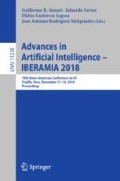Abstract
In robot soccer, collaborative behaviors are necessary to establish team coordination. In centralized architectures with global perception, the team coordination is carried out by a making decision system, where the team strategy is programmed out. Finite state machines are an alternative for the making decision systems design in order to assign players roles and behaviors, depending on the game conditions. In this paper a team strategy for robot soccer architectures with global perception and centralized control is proposed, through the use of synchronized state machines for collaborative behaviors among the players by using a synchronization function in some determinate states. This function is used to synchronize one machine state which selects the behavior of one player, with other state which selects the behavior of another player. The synchronization is used, for instance, to coordinate a pass between two players looking for a goal, or blocking an opposite goal by an opposite defender player. Synchronized state machines presented better results than strategies with state machines non-synchronized on different matches played.
Access this chapter
Tax calculation will be finalised at checkout
Purchases are for personal use only
References
Stulp, F., Utz, H., Isik, M.: Implicit coordination with shared belief: a heterogeneous robot soccer team case study. Adv. Robotics 24(7), 1017–1036 (2010)
Drogoul, A., Collinot, A.: Applying an agent-oriented methodology to the design of artificial organizations: a case study in robotic soccer. Auton Agent Multi-Ag 1(1), 113–129 (1998). https://doi.org/10.1023/A:101009862392
Stone, P., Veloso, M.: A layered approach to learning client behaviors in the robocup soccer server. Appl. Artif. Intell. 12, 165–188 (1998)
Marsella, S., Tambe, M., Adibi, J., Al-onaizan, Y., Kaminka, G., Muslea, I.: Experiences acquired in the design of RoboCup teams: a comparison of two fielded teams. Auton. Agent Multi-Ag. 4(1), 115–129 (2001). https://doi.org/10.1023/A:1010027016147
Ros, R., Arcos, J.L., Lopez de Mantaras, R., Veloso, M.: A case-based approach for coordinated action selection in robot soccer. Artif. Intell. 137(9–10), 1014–1039 (2009)
Cunha, J., Serra, R., Lau, N., Lopes, L.S., Neves, A.: Batch reinforcement learning for robotic soccer using the Q-batch update-rule. J. Intell. Robot. Syst. 80(3), 385–399 (2015). https://doi.org/10.1007/s10846-014-0171-1
Jolly, K.G., Sreerama, R., Vijayakumar, R.: Intelligent task planning and action selection of a mobile robot in a multi-agent system through a fuzzy neural network approach. Eng. Appl. Artif. Intel. 23(6), 923–933 (2010). https://doi.org/10.1016/j.engappai.2010.04.001
Chen, B., Zhang, A., Cao, L.: Autonomous intelligent decision-making system based on Bayesian SOM neural network for robot soccer. Neurocomputing 128, 447–458 (2014)
Hwang, K.S., Chen, Y.J., Lee, C.H.: Reinforcement learning in strategy selection for a coordinated multirobot system. IEEE Trans. Syst. Man. Cybern. A Syst. Hum. 37(6), 1151–1157 (2007)
Wang, J., Wang, T., Wang, X., Meng, X.: Multi-robot decision making based on coordination graphs. In: Mechatronics and Automation International Conference on, pp. 2393–2398 (2009)
Kontes, G., Lagoudakis, M.G.: Coordinated team play in the four-legged robocup league. In: 19th IEEE International Conference on Tools with Artificial Intelligence, pp. 109–116 (2007)
Guarnizo, J.G., Mellado, M.: Robot soccer strategy based on hierarchical finite state machine to centralized architectures. IEEE Lat. Am. Trans. 14(8), 3586–3596 (2016)
Lou, Y., Chen, B., Shi, H.: Decision making model based on state assessment and hierarchical FSM in robot soccer. In: Automatic Control and Artificial Intelligence (ACAI 2012)
Abreu, P.H., Castro, D., Almeida, F., Mendes-Moreira, J.: Improving a simulated soccer team’s performance through a memory-based collaborative filtering approach. Appl. Soft Comput. 23, 180–193 (2014). https://doi.org/10.5772/56189
Lou, Y., Chen, B., Shi, H. Decision making model based on state assessment and hierarchical FSM in robot soccer. In: International Conference on Automatic Control and Artificial Intelligence (ACAI 2012), Xiamen, pp. 756–759 (2012)
Stone, P., Veloso, M.: Task decomposition, dynamic role assignment, and low bandwidth communication for real-time strategic teamwork. Artif. Intell. 110(2), 241–273 (1999)
Palamar, P.F., Ziparo, V.A., Iocchi, L., Nardi, D., Lima, P.: Teamwork design based on petri net plans. In: Robot Soccer World Cup XII, RoboCup 2008, pp. 200–211 (2008)
Cardoso, P., Molina, L., Freire E.O., Carvalho, E.A.N.: A methodology to designing strategies for robot soccer based on discrete event systems formalism. In: Brazilian Robotics Symposium and Latin American Robotics Symposium, Fortaleza, pp. 143–149 (2012)
Yang, M., Jia, Y.: Action utility prediction and role task allocation in robot soccer system. In: 12th International Conference on IEEE Control Automation Robotics and Vision (ICARCV), Guangzhou, pp. 112–117 (2012)
Guarnizo, J.G., Mellado, M., Low, C.-L., Blanes, F.: Architecting centralized coordination of soccer robots based on principle solution. Adv. Robot. 29(15), 989–1004 (2015)
Diaz, N.L., Guarnizo, J.G., Mellado, M., Vasquez, J.C., Guerrero, J.M.: A robot-soccer-coordination inspired control architecture applied to islanded microgrids. IEEE Trans. Power Electron. 32(4), 2728–2742 (2017)
Guarnizo, J.G., Mellado, M.: Centralized robot soccer architecture based on roles. RIAI 13(3), 370–380 (2016). https://doi.org/10.1016/j.riai.2016.05.005
Acknowledgements
This work has been funded by “Decimosegunda convocatoria interna para el fomento de la investigación - FODEIN 2018” at Universidad Santo Tomás, Bogotá Colombia, entlited “Localización y mapeo por medio de redes inalámbricas de datos aplicado a roots móviles colaborativos”, project code: 1836001.
Author information
Authors and Affiliations
Corresponding author
Editor information
Editors and Affiliations
Rights and permissions
Copyright information
© 2018 Springer Nature Switzerland AG
About this paper
Cite this paper
Guarnizo, J.G., Mellado, M. (2018). State Machines Synchronization for Collaborative Behaviors Applied to Centralized Robot Soccer Teams. In: Simari, G., Fermé, E., Gutiérrez Segura, F., Rodríguez Melquiades, J. (eds) Advances in Artificial Intelligence - IBERAMIA 2018. IBERAMIA 2018. Lecture Notes in Computer Science(), vol 11238. Springer, Cham. https://doi.org/10.1007/978-3-030-03928-8_11
Download citation
DOI: https://doi.org/10.1007/978-3-030-03928-8_11
Published:
Publisher Name: Springer, Cham
Print ISBN: 978-3-030-03927-1
Online ISBN: 978-3-030-03928-8
eBook Packages: Computer ScienceComputer Science (R0)

